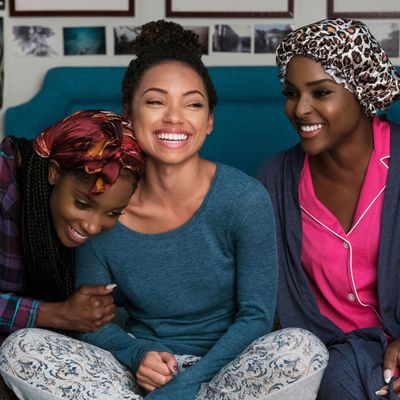
The title of the Netflix series Dear White People is also the phrase that opens each episode of the titular campus radio show, wherein the woke biracial heroine Samantha (Logan Browning) climbs atop a virtual soapbox and directly addresses whatever social ills weigh most heavily on her at that moment, in sing-song accusatory language that draws equally on poetry, gospel, and an editorial page rant. The storytelling on Justin Simien’s show is just as knowingly blunt yet energized. It describes life on the racially mixed Winchester University campus in the manner of a 19th-century novel of manners, told by a wry third-person narrator (Giancarlo Esposito), and lets its diverse core group of budding intellectuals and would-be leaders, all of whom were probably big fish in small ponds at their high schools, monologue at each other in the manner of characters penned by Aaron Sorkin or Shonda Rhimes (who gets name-checked this season). Like many notable American shows this year including Atlanta and Westworld, Dear White People has leveled up in quality during its second season — no small feat considering how consistently strong it was during its freshman outing.
It’s done this by embracing the drama’s essentially rhetorical nature. Dear White People is an argument being made through characters, via metaphor and melodrama. It’s as understated as an early Spike Lee joint, and as exuberantly inventive. It’s a series that’s as ever-presently in touch with its cultural influences as Mr. Robot, and that constantly pays homage to all the art that inspired it in ways both obvious (Lee’s visual and musical influence is all over this show) and subtle (Winchester shares the same last name as one of the whitest characters in TV history, M*A*S*H’s Charles Emerson Winchester III). Dear White People is not averse to taking the most direct route toward whatever point it’s trying to make, verbally hanging labels on people and things in order to warn against the misuse of labels. “You’re Elvis and I’m Chuck Berry,” Sam tells her white ex-boyfriend Gabe (John Patrick Amedori), who’s making a documentary that purports to challenge his own racism; she’s right but also wrong. “I’m being reborn, Lionel!” cries Troy Fairbanks (Brandon P. Bell), headmaster’s son and onetime mainstream political leader, tripping on ’shrooms as he rises naked from a fountain to the tune of Thus Spake Zarathustra, the most famous music cue from 2001: A Space Odyssey, a psychedelic spectacle of cosmic evolution and rebirth — one of the funniest non-epiphanies since Tony Soprano stood on a cliff in Las Vegas, also tripping, and yelled, “I get it!”
When you get to the end of season two — which I’m spoiling here, so consider yourself warned — it seems delightful and inevitable that the story would climax underground, in catacombs, where Esposito’s narrator emerges from the gloom, as if the stage manager of Our Town had been named the newest Defense Against the Dark Arts instructor at Hogwarts. (What the hell is he doing down there? Does he live there? Is he even real? What a wonderfully bizarre ending!) The sheer brazenness of this image is bound to alienate some viewers even as it thrills others. It’s a wonder Simien didn’t stage his cliff-hanger ending on an actual cliff.
The season’s narrative through line is an investigation (driven mainly by Sam and DeRon Horton’s bespectacled student journalist Lionel Higgins) into the buried racial history of Winchester, partially articulated in dynamic period flashbacks reminiscent of Magnolia (which likewise featured plummy third-person narration). Talk of the slave trade, the Underground Railroad, eugenics, the Illuminati and Masons, Jim Crow and integration are threaded through the hookups, breakups, and personal rivalries that drive the show’s scene-by-scene storytelling. The secret societies that represent entrenched American power (white) and those seeking to undermine and/or claim it for themselves (African-American) are identified and then either exposed or embraced, from the society of black super-achievers seeking to press the disgraced Troy into carrying on their legacy, to the revelation that the sinister troll trying to bring right-wing media celebrities to campus and wage psychological warfare against Sam was actually Brandon’s boss Silvio (D.J. Blickenstaff), a gay Hispanic man so sick of woke liberalism on campus that he decided to try to join a club that ordinarily would never have someone like him as a member. There are mysterious insignias and incriminating document dumps, yellowed newspaper clippings and texts, and maps that yield X-marks-the-spot style answers. At times, the series seems to owe as much to National Treasure as to any campus comedy you can name.
Season two doubles down on the show’s half-stand-alone, half-serialized structure (an approach that Atlanta also takes, in its own, far eerier manner). The show moves the main narrative forward even as it focuses on individual characters (including Marque Richardson’s PTSD-suffering Reggie Green and Ashley Blain Featherson’s Joelle, who gets her first stand-alone episode). Ultimately, the conspiracy/secret history stuff feels a bit disorganized and doesn’t register as strongly as it probably should have.
But this can be seen as a backhanded compliment to how compelling each lead player’s story was, and how deftly Simien and his collaborators told them. When you’ve got a story as simple and powerful as Sam going home to attend her father’s funeral and reckoning with her heritage, Sam and Gabe fighting it out one-on-one in the radio station in a brilliant piece of filmed theater, or Antoinette Robertson’s Coco deciding to get an abortion (in an episode with an Occurrence at Owl Creek Bridge–style fakeout ending, directed by Boys Don’t Cry’s Kimberly Peirce), the bigger story can seem overly broad, or just too big, even as it puts a wider frame around the individual stories and connects them with American history. What a long, strange trip these kids are on; this country, too. As Troy’s father tells him, smoking a joint in one of the campus’s halls of power, “This is the world you’re trying to find yourself in.”





